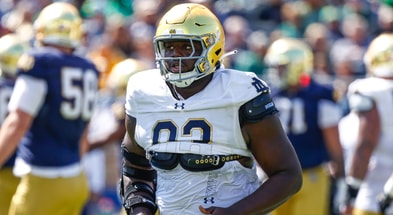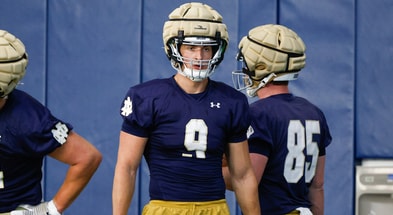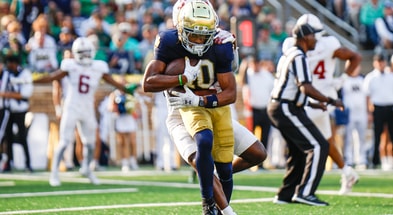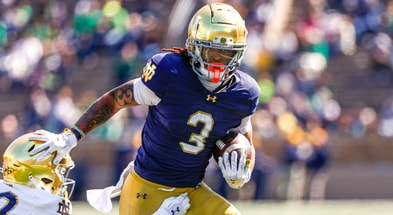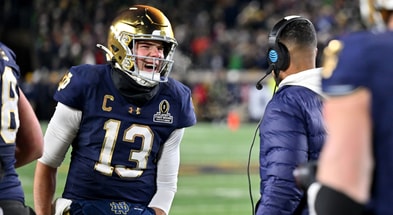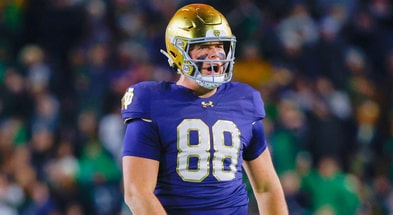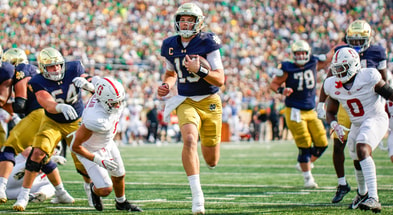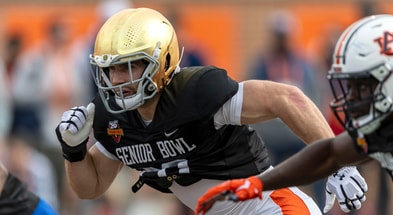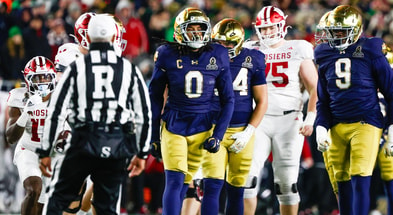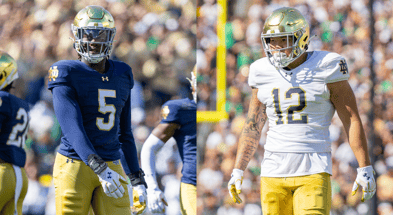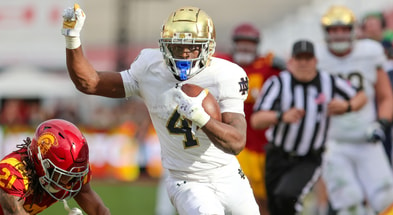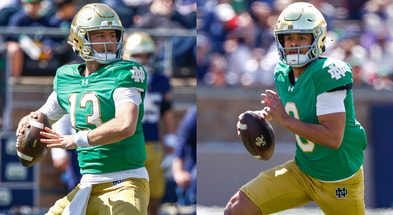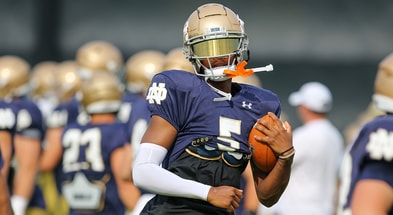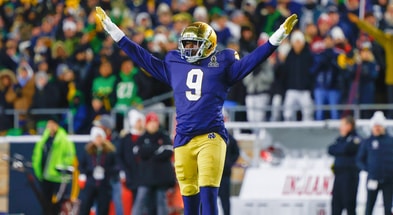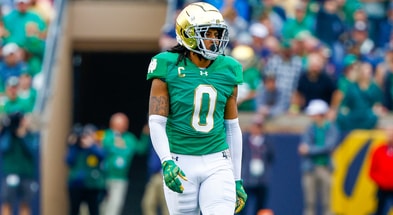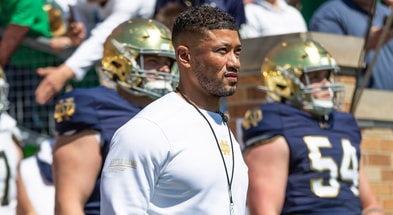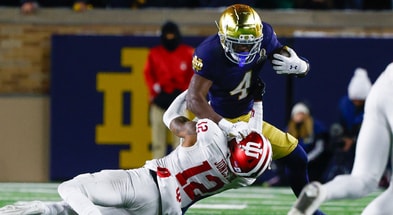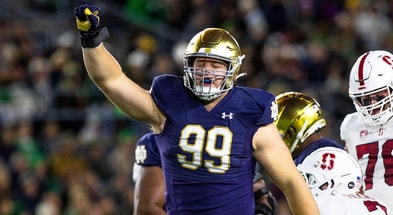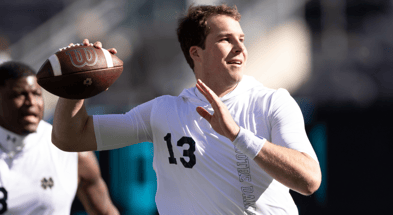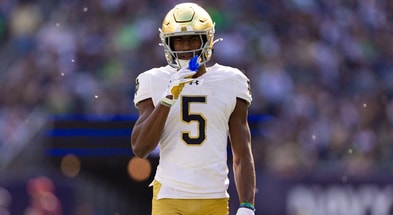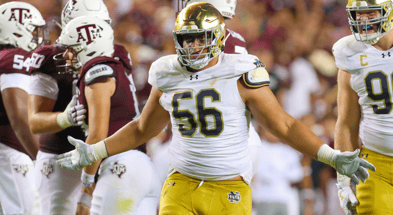Former Notre Dame football DE Myron Tagovailoa-Amosa opens up about mental health battle after losing his father
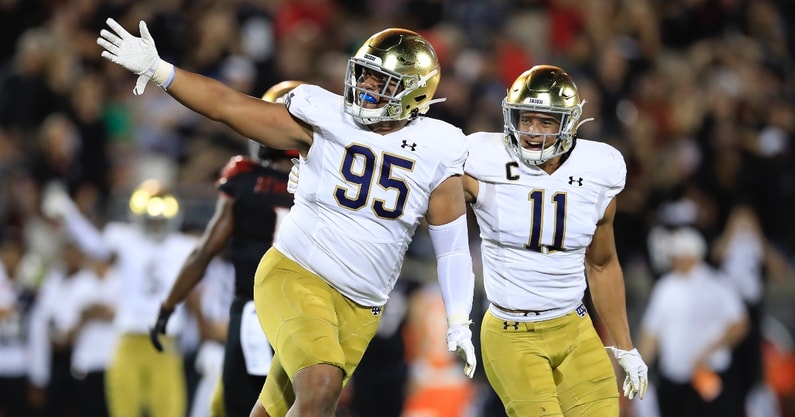
When Myron Tagovailoa-Amosa returned a fumble 70 yards for a touchdown on senior day, in his last game ever inside Notre Dame Stadium, Fighting Irish fans merely saw what they’re privy to most other Saturdays in the fall.
A Notre Dame player made a spectacular play to put the finishing touches on an Irish victory in front of over 70,000 fans clad in blue, gold and green. It has happened over and over again in the illustrious history of the program.
But that single score meant something a little more than many others, even if it came in garbage time of a 55-0 rout of Georgia Tech. What fans couldn’t see were the down days Tagovailoa-Amosa had in the three months prior.
There were many of them.
Tagovailoa-Amosa lost his father unexpectedly on Aug. 8. Days later, when he was in his native Hawaii for the funeral service, Tagovailoa-Amosa was named a Notre Dame team captain for the 2021 season in a video call with his teammates and coaches. An emotional Tagovailoa-Amosa told them what the honor meant to him. A lot. How could it not, given the circumstances?
“The love that you guys have shown me has pushed me through everyday,” Tagovailoa-Amosa said through tears.
PROMOTION: Sign up for just $1 for your first year at Blue & Gold
Tagovailoa-Amosa returned from Hawaii and immediately got to work. Now head coach Marcus Freeman, then the Notre Dame defensive coordinator, didn’t expect him to get back into the fold so quickly. Tagovailoa-Amosa felt compelled to. He told the Grotto Network football became his “escape.” Time away from the game was the last thing he thought he needed.
That was before he allowed himself to totally endure the totality of grieving.
“You need time to process things, especially when you lose a family member,” Tagovailoa-Amosa told the Grotto Network. “You just need time. Sometimes you just need that time alone. But from a mental health standpoint, that’s when that time alone can become an unhealthy habit of isolation. And that’s what it was for me.”
Football can’t fully allow one to evade such loss, such pain. Athletes and coaches tend to be some of the last people to admit that. Notre Dame strength and conditioning coach Matt Balis is determined to get people in his profession to shed that stigma.
Top 10
- 1New
Johntay Cook
Headed to ACC
- 2Hot
Fan who fell from stands
20-year old former CFB player
- 3Trending
Donald Trump
Wants Saban back as Alabama HC
- 4
Kentucky, St. John's
Set to play in 2025-26
- 5
Bracketology
Way Too Early Tournament projection
Get the On3 Top 10 to your inbox every morning
By clicking "Subscribe to Newsletter", I agree to On3's Privacy Notice, Terms, and use of my personal information described therein.
“We all go through the hard stuff, adversity and challenges,” Balis said in the Grotto Network video. “But it’s how you deal with it. As men, sometimes we don’t deal with it the best way we can in terms of talking about it. Especially football players and tough guys.
“But that doesn’t mean you don’t have feelings and emotions. You have to talk and open up. There is no reason why us, as men, shouldn’t be able to talk about this and help one another and be teammates for one another. We are all going through hard stuff.”
Tagovailoa-Amosa wishes he understood that in the moment — the moments, plural. Again, there were many.
“There was something in my head, mentally, that was telling me to not talk to people,” Tagovailoa-Amosa said in the Grotto Network video. “That’s why it’s so important for me to stress for those of you who are battling mental health issues and stress and anxiety to listen and hear me when I say this: if you need help, seek it.”
Tagovailoa-Amosa seems to be better now. Nobody else knows that, though, unless he tells them. He has no issues doing so anymore. The “invisible monster” he “can’t touch” doesn’t come around as much when he’s in touch with his emotions and socially vulnerable to friends, family and former teammates.
Tagovailoa-Amosa wasn’t selected in the NFL Draft last month, but he signed an undrafted free agent deal with the Las Vegas Raiders — his late father’s favorite team. Some things are just meant to be, like scoring a 70-yard touchdown in your last collegiate home game.

